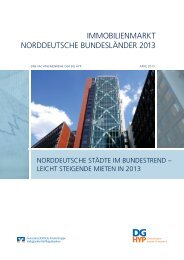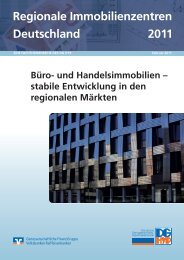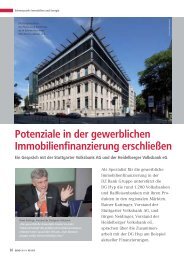Real Estate Market Germany 2009 - Deutsche Genossenschafts ...
Real Estate Market Germany 2009 - Deutsche Genossenschafts ...
Real Estate Market Germany 2009 - Deutsche Genossenschafts ...
Create successful ePaper yourself
Turn your PDF publications into a flip-book with our unique Google optimized e-Paper software.
DG HYP REAL ESTATE MARKET GERMANY SEPTEMBER <strong>2009</strong><br />
Frankfurt<br />
With around 2 sq m of per capita sales space, of the cities observed Frankfurt has by far<br />
the largest volume of retail space. By comparison: the average throughout <strong>Germany</strong> is<br />
around 1.5 sq m and the average in property centres is about 1.6 sq m. Next year a large<br />
number of new retail properties will also be completed in Frankfurt, and the supply of sales<br />
space will then show an above-average increase to 2.1 sq m. However, retailers in the<br />
banking capital are viewing the future with some concern since unemployment is likely to<br />
rise sharply, which will in turn depress retail sales. On account of the strong expansion of<br />
retail space in the recent past and the forthcoming growth, we expect the decline in rents in<br />
Frankfurt to be above-average compared to other centres, with an anticipated decline of<br />
4 per cent this year and 3 per cent next year.<br />
Retail rents in top locations in EUR sq m<br />
230<br />
210<br />
190<br />
170<br />
150<br />
130<br />
110<br />
90<br />
70<br />
50<br />
1997 1998 1999 2000 2001 2002 2003 2004 2005 2006 2007 2008 <strong>2009</strong>e<br />
Source: Feri, DZ BANK Research forecast<br />
Berlin Frankfurt Hamburg Munich<br />
Munich<br />
In contrast to the city on the river Main, the lowest supply of per capita retail space is to be<br />
found on the river Isar: at only 1.3 sq m in 2008 the figure was well below the German<br />
average and only two thirds of the level in Frankfurt. Since the image of Munich as an<br />
attractive shopping city with many tourist attractions has not suffered in recent years and the<br />
population continues to grow steadily, landlords of retail properties have also benefited from<br />
continuous growth in rents in the last ten years. At EUR 212.50 per sq m, rents were 45 per<br />
cent higher in 2008 than in 1998. By comparison: consumer prices have increased by<br />
almost 20 per cent in Bavaria in the same period.<br />
Although Munich continues to act as a magnet for the surrounding area, we still expect<br />
unemployment there and in the surrounding area to increase visibly next year. We also<br />
expect a slight decline in the disposable incomes of private households. As a result of the<br />
global economic crisis, the number of foreign tourists has also fallen. This has dampened<br />
the expectations of retailers, and no sales growth is likely for the time being. What are very<br />
high rents in Munich compared to the rest of <strong>Germany</strong> are therefore increasingly difficult to<br />
justify, however the decline is likely to be only below-average at around 2 per cent. In 2010<br />
we anticipate a weaker decline of only one percent. The main reason for the below-average<br />
decline is the comparative shortage of available space.<br />
Frankfurt: large supply of per capita<br />
sales space<br />
…therefore above‐average decline in<br />
rents<br />
Munich: retail rents have risen by<br />
45 per cent since 1998<br />
Decline in rent likely to be below‐<br />
average<br />
11














